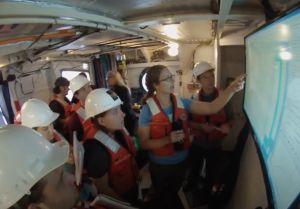Flipping a Foundational Interdisciplinary Graduate Curriculum While Strengthening Connections Outside Academia

Traditional approaches to training first-year graduate students in interdisciplinary fields typically use instructional methods that do not reflect the individualized needs of the students. The course structure additionally teaches laboratory and field methods separately, divorcing context from theory and skills.
The University of Minnesota Duluth piloted and tested a re-design of the first-year graduate studies in limnology, the scientific study of inland waters including lakes, rivers, and wetlands. Limnology is an interdisciplinary field that draws graduate students with backgrounds in chemistry, physics, biology, geology, and other disciplines. Thus, an integrated approach that builds from basic concepts toward each of these specialties separately and together is needed. The multi-faceted model included a flipped-classroom active-learning environment, cohort building, and research experience that involved community partners.
Read the abstract
